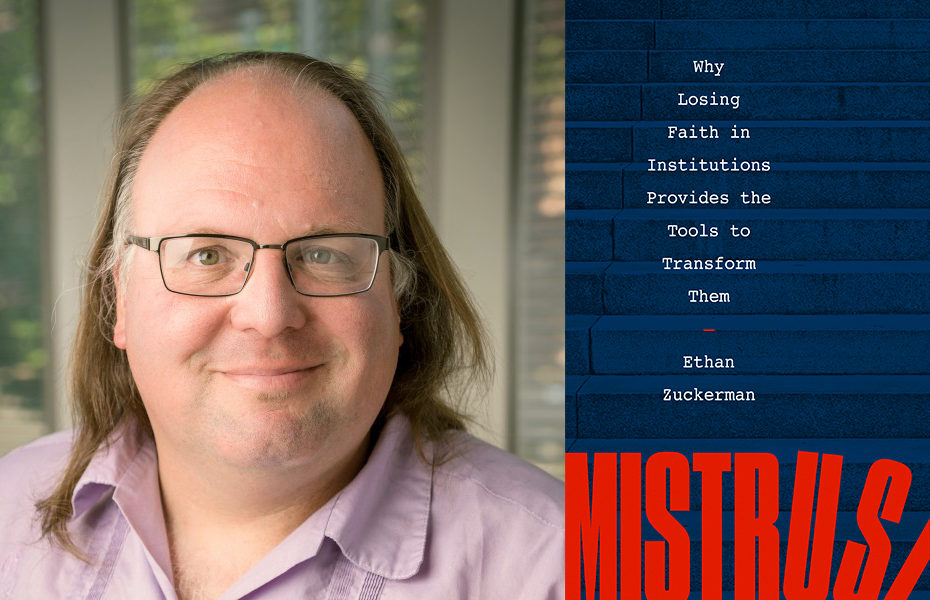My new book, Mistrust: How Losing Faith in Institutions Provides the Tools to Transform Them, launches today. For those of you who live near me in western New England, I’ll be on WAMC with Joe Donahue this morning talking about the book. (You can listen online even if you’re not lucky enough to live within driving distance of Albany.) The Atlantic is running a new essay from me, adapted from the first chapter of the book. And Mistrust should be on shelves at your local bookstore.
I'm not really sure what it means for a book to hit the shelves at a moment when you probably shouldn't be spending too much time browsing in any store, but it's a reminder of something that's on my mind with this book: books are letters to a future world you can't fully imagine.
Books take a long time to make. Unless you’re a celebrity with a surefire bestseller, it takes several months for your book to be edited, copyedited, indexed, designed, printed and distributed, even when you’re with a terrific publisher like mine. And that’s just what happens after the manuscript is submitted. Depending on how quickly an author researches and writes, it has likely been years between the moment someone decided “I should write a book about this!” and the book’s release date.
I often work through my ideas by talking about them in public. I’ve got a slide deck from December 2013 that outlines the core argument of Mistrust. I wrote up my notes for the talk, and it’s turned into one of my most cited papers, published in 2014. In other words, I’ve been working on this book for at least eight years at this point. And given the events of the past year – our catastrophic failure to address Covid head on, the hijacking of the Republican party by QAnon, the attack on the Capitol – I feel like I could keep updating it, chapter by chapter.
I started writing Mistrust when Trump was an odd fringe figure – a washed up con man who had gained a second few moments of fame by fanning the flames of birtherism. My inspiration for the book wasn’t the way mistrust in institutions has been weaponized to support Trump’s cult of personality. Instead, I was thinking about the numerous people I respected who had joined the Occupy movement as a way of seeking change when the prospect of transforming society – under an Obama presidency! – seemed impossible through a sclerotic Congress and entrenched special interest groups. In the far distant past of 2011-2, it was the left expressing their fear that institutions were failing and that real change would require dismantling and revamping some of the institutions that had failed most catastrophically.
And now, I’ve written a book arguing about the value of insurrectionism at a moment where violent insurrectionists have killed a police officer while storming the US Capitol. In fairness, I meant something very different from the Qoup when I adopted Chris Hayes’s terms “institutionalist” and “insurrectionist”. For me, institutionalists are people who try to fix existing systems, no matter how broken they are, while insurrectionists are those who believe those systems must be replaced with new, better systems. Raiding the Capitol isn’t insurrection – it’s terrorism. Those trashing Congressional offices weren’t looking to build new institutions, but to ensure that those in power remain in power, even after electoral refutation.
But despite the complexities of publishing a book that begins with Shays Rebellion and ends before Trump’s defeat at the polls, I feel like Mistrust has something to say about this particular moment. It’s too easy to dismiss those who’ve fallen down the QAnon rabbit hole because the belief system they’ve adopted is so utterly crazy. But QAnon is a helpful caution: mistrust is powerful fuel, and if we don’t harness our dissatisfaction with broken systems to the work of (re)building institutions, it becomes an accelerant that can burn things down instead. Similarly, a caution from the left: we may hope for normalcy under a Biden presidency, but we cannot afford to stand still. We need a break from the perpetual craziness of the Trump years, but the deep, systemic problems that will tear our society apart – racism, inequality, sexism, the climate crisis – weren’t being handled well by our institutions under Obama, and they still need to change under Biden.
With white nationalists assaulting the Capitol, “insurrection” calls up images of mindless, stupid violence. But the insurrection we need is that of Defund the Police, a movement that believes that the police in many communities are too broken to be reformed, and instead demand a radical rethinking of what it means to protect and serve a community. That’s the thinking I hope to learn from, to showcase and to study in this book, and I hope that the insanity of January 6th doesn’t stop people of all political stripes from imagining possible futures very different from the ones we have now.
This isn’t the world I hoped to release a book into, but perhaps it can be part of the transformation into a better one.

Greetings, Ethan. I just looked at your book and I find it very impressive. Reason I’m contacting you is because I’m working on a similar book, called What Ever Happened to Trust.
I have no idea if you’d be interested in some dialogue about this, but it would be nice to chat with a fellow writer with a similar focus.
You and I know how solitary is this job of authoring, so dialogue is always a way of making it much more interesting.
Let me know if this finds a receptive fellow writer.
Best,
David Ryback, Ph.D.
Comments are closed.